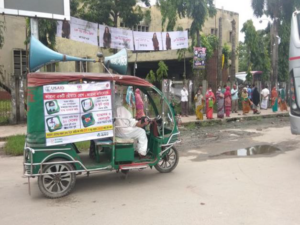Responding to health and safety concerns associated with COVID-19, Counterpart’s Promoting Advocacy and Rights project in Bangladesh awarded grants to support local policy advocacy to reduce rates of gender-based violence and drug abuse and the compound effects of the pandemic on vulnerable populations.

Light House strengthened advocacy around social inclusion amid the pandemic in the Rajshahi, Natore, and Bogura districts. Using a combination of online and offline tools to reach and incorporate underserved and marginalized populations, including drug users, in local decision-making, Light House raised awareness of increased risk of COVID-19 exposure and response mechanisms among CSOs, community members, and local government actors, including those who may not have access to internet or were in quarantine.
Through a grant from Counterpart, Light House:
- Established alternative mechanisms for collecting and disseminating information, focusing on the increased risks of COVID-19 and related human rights violations. This included using varied mass media outlets, ensuring the active engagement of print media, electronic media (including community radio), voice messages, and various social media platforms including YouTube and Facebook.
Media representatives committed to publishing real-time information to raise awareness about opportunities for safety net programs and human rights management, including public health messaging and a petition to the Prime Minister’s Office for targeted support for marginalized groups. - Established mechanisms to collaborate with and maintain oversight of government service delivery as well as monitoring and documenting human rights issues in the districts of Rajshahi, Natore, and Bogura.
Light House arranged and facilitated virtual advocacy forums to sensitize the National Institute of Local Government, CSOs, government officials, and media on the proper and equitable distribution of safety net and incentive programs as well as the importance of safeguarding human rights and preventing stigma and discrimination associated with COVID-19 infection. Light House shared information and advocated for government action regarding gaps, limitations, and opportunities for monitoring the healthcare system, service delivery, and unreasonable testing fees for ordinary citizens, and submitted 13 human rights reports.
Rupantar and its partner AVAS aimed to strengthen advocacy around gender and social inclusion amid the pandemic in the Khulna and Barishal districts of Bangladesh. Through a grant from Counterpart, Rupantar worked to ensure local actors were aware of and could support local authorities to be inclusive and sensitive to gender-based issues in the COVID-19 context through:
- 52,500 pieces of offline awareness-raising material, reaching approximately 262,500 people.
- 4,232 hours of public service announcements in all Upazilas of the Khulna and Barisal districts.
- Bi-weekly taskforce meetings to raise awareness of and promote government agencies’ proactive responses to stop gender-based violence and early marriage as well as curb COVID-19.
- Folk songs about various aspects of gender-based violence to raise awareness among civil society and the community.




